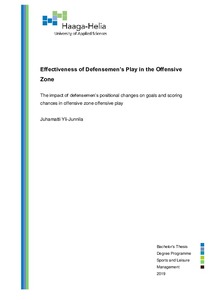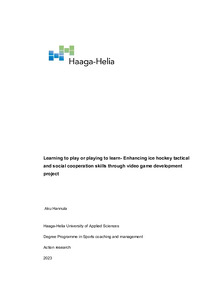Inclusive playful learning : a realistic means of adapting the role of the teacher and framework to improve playful learning for students with Executive Dysfunction
Fangel-Lloyd, Lisbeth (2023)
Fangel-Lloyd, Lisbeth
2023
Julkaisun pysyvä osoite on
https://urn.fi/URN:NBN:fi:amk-2023103128226
https://urn.fi/URN:NBN:fi:amk-2023103128226
Tiivistelmä
Playful Learning is widely and uncritically used as a panacea to current issues in education such as student disengagement, disenchantment, stress, and anxiety. It is also being used as a pedagogy, to encourage creativity and experimentation, to contribute to what may be considered a 21st century education.
Playful Learning has numerous definitions ranging from “meaningful, joyful, engaging, iterative and socially interactive” through to the succinct “Choice, Wonder and Delight”. Regardless of definition, playful learning appears to assume that all students have the necessary executive functioning skills to access the learning opportunities and that playful learning is thus inherently inclusive.
It is widely accepted that some learners, such as those who have ADHD or Dyslexia, need regularity and consistency. This comes with structured learning experiences that give academic scaffolds to provide a firm footing, where students’ own executive functioning abilities are lacking.
The objective of this study was to explore the commonalities between Learning Through Play, student inclusion needs and IB ATL skills to identify elements of Learning Through Play that work for students with different needs.
Outcomes of conventional playful learning for middle school students are essentially thinking, communication and social skills. The study therefore explored how the IB Approaches To Learning (ATL) skills for Middle Years Programme (MYP) framework could be used to provide a more structured approach to Playful Learning and still achieve the same outcomes.
The study briefly reviewed the IB MYP ATL skills framework (including teaching activities) for thinking, communication and social skills and compared these with Playful Learning principles. The aim of this was to identify commonalities. The study then reviewed these identified commonalities in the light of established needs to be inclusive of all students.
The key findings are that the IB MYP ATL skills framework combined with playful learning opportunities allow for vertical and horizontal articulation that supports students with executive function issues. The outcomes of this study, termed Inclusive Playful Learning (IPL), are recommendations that may be used by teachers and curriculum designers. This is done in terms of reuse of existing systems and does not impose unrealistic financial constraints on mainstream education.
Playful Learning has numerous definitions ranging from “meaningful, joyful, engaging, iterative and socially interactive” through to the succinct “Choice, Wonder and Delight”. Regardless of definition, playful learning appears to assume that all students have the necessary executive functioning skills to access the learning opportunities and that playful learning is thus inherently inclusive.
It is widely accepted that some learners, such as those who have ADHD or Dyslexia, need regularity and consistency. This comes with structured learning experiences that give academic scaffolds to provide a firm footing, where students’ own executive functioning abilities are lacking.
The objective of this study was to explore the commonalities between Learning Through Play, student inclusion needs and IB ATL skills to identify elements of Learning Through Play that work for students with different needs.
Outcomes of conventional playful learning for middle school students are essentially thinking, communication and social skills. The study therefore explored how the IB Approaches To Learning (ATL) skills for Middle Years Programme (MYP) framework could be used to provide a more structured approach to Playful Learning and still achieve the same outcomes.
The study briefly reviewed the IB MYP ATL skills framework (including teaching activities) for thinking, communication and social skills and compared these with Playful Learning principles. The aim of this was to identify commonalities. The study then reviewed these identified commonalities in the light of established needs to be inclusive of all students.
The key findings are that the IB MYP ATL skills framework combined with playful learning opportunities allow for vertical and horizontal articulation that supports students with executive function issues. The outcomes of this study, termed Inclusive Playful Learning (IPL), are recommendations that may be used by teachers and curriculum designers. This is done in terms of reuse of existing systems and does not impose unrealistic financial constraints on mainstream education.
Kokoelmat
Samankaltainen aineisto
Näytetään aineisto, joilla on samankaltaisia nimekkeitä, tekijöitä tai asiasanoja.
-
A. Thesis consert : “Turku Young Soloists” 28.05.2014, Sigyn-hall B. Solo and orchestra violin playing : differences of playing techniques and understanding of both playing forms
Li, Qi (Turun ammattikorkeakoulu, 2017)This thesis consists of two parts, the artistic and the written part. The artistic part is my thesis concert ‘Turku Young Soloists’ in 2014 where I played the 1st movement of J. Brahms violin concerto in D major as the ... -
Effectivess of Defensemen's play in the offensive zone : the impact of defensemen's positional changes on goals and scoring changes in offensive zone offensive play
Yli-Junnila, Juhamatti (2019)The role of offensive zone offensive play has increased in modern ice hockey with the increase in size of the offensive zone. Teams now need to have various forms of offensive zone team systems in order to increase the ... -
Learning to play or playing to learn- Enhancing ice hockey tactical and social cooperation skills through video game development project
Hannula, Aku (2023)This development project was born from the need and interest to create an innovative video game-based teaching method to enhance ice hockey tactical and social skills. The implementer of this work was an assistant coach ...



